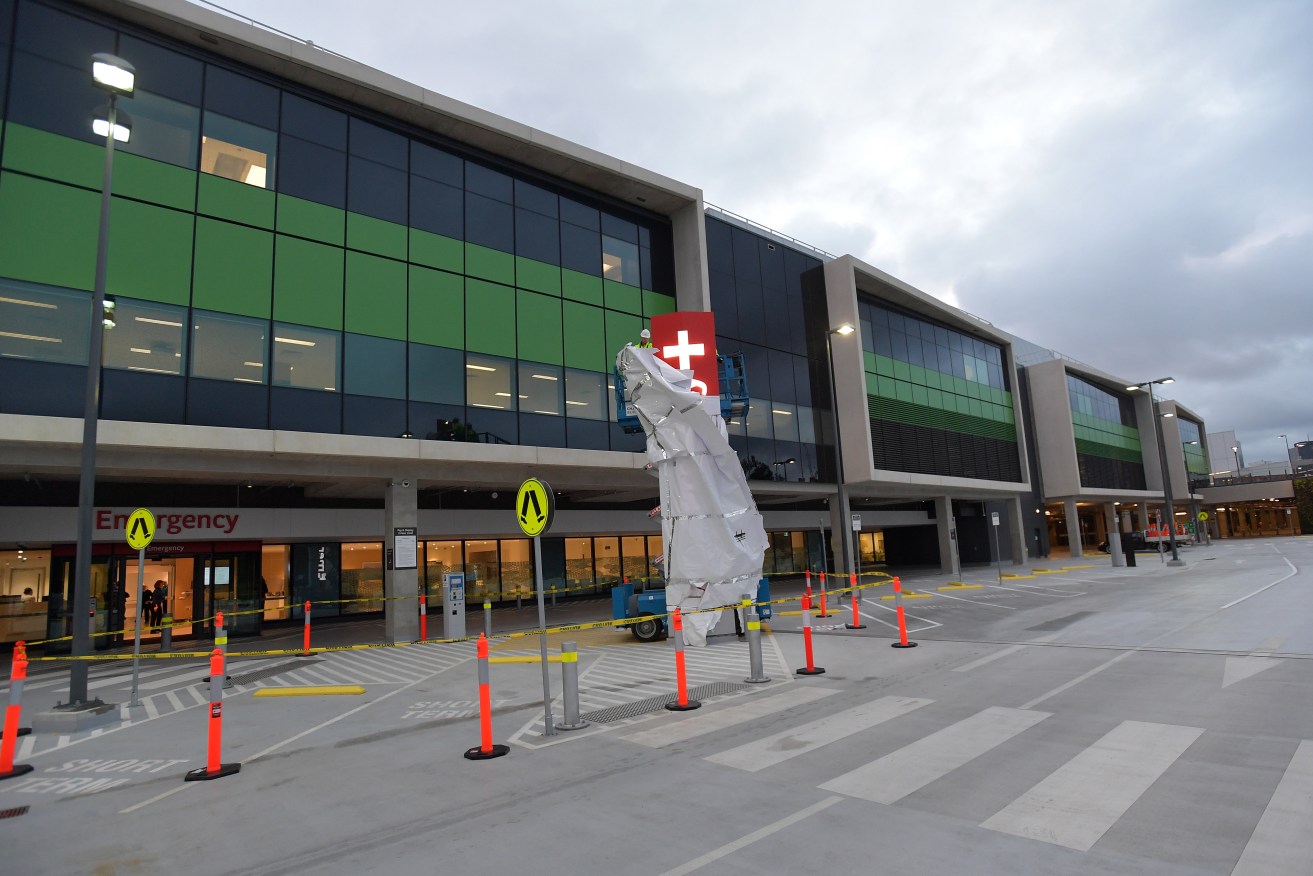SA unprepared for health, social “tsunami” of Holden closure: researcher
A leading researcher has urged new Health Minister Peter Malinauskas to dramatically refocus State Government investment onto preventative health services or face a “tsunami” of social issues following next month’s Holden closure.


Construction workers unveil the emergency sign during the official opening of the emergency department at the new Royal Adelaide Hospital. Photo: AAP/David Mariuz
Flinders University health researcher Professor Fran Baum told InDaily the Government had stripped South Australia’s community health services of funding during Jack Snelling’s tenure as Health Minister in favour of massive investments in hospitals – like the $2.4 billion new Royal Adelaide Hospital, which opened earlier this month.
Baum, director of the university’s Southgate Institute for Health, Society and Equity, said this had opened “glaring gaps” in social and health policy, which threatened disastrous consequences once the Holden’s Elizabeth plant finally closes in October.
SA Health was forced to take extraordinary measures – including directing ambulances only to attend “urgent” cases – when all of Adelaide’s metropolitan hospitals were operating over capacity, at the highest “code white” level last week.
Announcing the measures, then-Health Minister Jack Snelling – who resigned this week, replaced by Malinauskas – said he would write to federal Health Minister Greg Hunt requesting an urgent meeting to deal with the fact that patients were not accessing primary health care such as general practitioners as much as they did in previous years.
Baum argues the State Government needs to urgently rebuild South Australia’s network of community health centres or face more extreme pressure on emergency departments.
“Unless there is heavy investment in rebuilding community-based health services, and infrastructure such as neighbourhood housing and facilities such as libraries, then there will be increasing pressure on our hospitals,” she said.
“The Government under Health Minister Jack Snelling has been closing community health services and turning them into hospital outreach programs.
“Now it’s crunch time – the incoming Health Minister has an opportunity to invest more in community health services and relieve pressure on hospitals, both in the short and long term.
“The Government needs to start rebuilding community health services or face a tsunami of health and social equity issues in 10 to 20 years.”
She told InDaily community health services, which engage at-risk groups to prevent illnesses before they begin aren’t “big and glamorous like hospitals”, but just as important.
“We used to have a network of community health centres (in SA),” she said.
“We no-longer do that kind of preventative health promotion in South Australia.
“Once we have investment in hospitals … let’s now have a real program of rebuilding the community health service that we once had.”
But an SA Health spokesperson told InDaily the government had made significant investments in community health care.
“SA Health has established GP Plus Health Care Centres and GP Plus Super Clinics across the state to provide a broad range of health care services to local communities,” the spokesperson said.
“The GP Plus Health care Centre in Elizabeth offers more than 10 health services to keep people in the northern suburbs healthy and avoid them having to use hospital services.
“In addition, the Northern Adelaide Local Health Network provides a range of mental health services to the community, including acute, early intervention, rehabilitation, recovery and specialist mental health care services tailored to the needs of consumers in the area.”
Baum added that there was international evidence that every dollar invested in preventative health care services saved $3 to $4 in the cost of hospital, criminal justice and education services.
“That will, in the future, pay off greatly (through) a healthier population and … much less mental health problems.
“If you want to stop the pressure on … hospitals it’s really important to invest in (community health programs).
She said South Australians affected by the Holden closure were particularly in need of preventative community health services.
“There’s a lot of focus on jobs, jobs, jobs, but we know that when workers get laid off there are a lot of mental health issues and family disruption,” she said.
Baum – who was also involved in researching the effects of the closure of the Mitsubishi car manufacturing plan a decade ago – said Governments were often reluctant to invest heavily in prevention, and that South Australia needed a popular movement to convince politicians it was worth the money.
“It’s always hard to get governments to invest in prevention,” she said.
“The challenge is for all of use to create a popular movement for prevention … how we actually make that into a political imperative.
InDaily has contacted Malinauskas’ office for comment.




